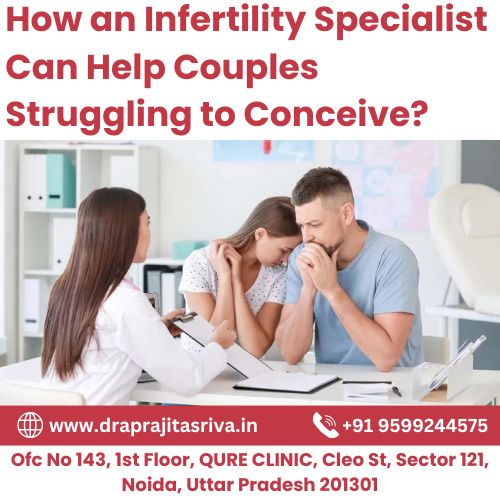Are you and your partner trying to conceive but facing challenges?
You’re not alone! One in six couples globally experience infertility, yet medical advancements have made parenthood possible for many. The key is finding the right guidance and support.
Understanding Infertility: When to Seek Help?
Infertility is defined as the inability to conceive after 12 months of regular, unprotected intercourse (or six months if you’re over 35).
Studies show that 40% of infertility cases are due to female factors, such as ovulation disorders, blocked fallopian tubes, or endometriosis.

About 30% of cases stem from male factors, including low sperm count, poor sperm motility, or hormonal imbalances.
Another 20% of infertility cases involve a combination of male and female factors, while the remaining 10% remain unexplained and require further testing.
Did you know? Infertility is not just a women’s issue—male infertility accounts for nearly half of all cases. Understanding this can help couples seek the right treatment and support together.
How an Infertility Specialist Can Help?
An infertility specialist in Noida identifies the root cause of fertility struggles and tailors a treatment plan to increase your chances of conception.
They conduct thorough evaluations, recommend the best treatment approach, and provide continuous guidance throughout the journey to parenthood.
Step 1: Diagnosis Through Advanced Testing
Infertility specialists conduct various diagnostic tests to pinpoint the exact cause of infertility.
Hormone testing helps assess levels of follicle-stimulating hormone (FSH), luteinizing hormone (LH), and testosterone, which play crucial roles in reproduction. Ovarian reserve testing, such as Anti-Müllerian Hormone (AMH) levels, helps predict a woman’s egg supply.
Semen analysis evaluates sperm count, shape, and motility to identify male fertility issues. Ultrasound and hysterosalpingography (HSG) help detect uterine abnormalities, fibroids, or blocked fallopian tubes.
In some cases, genetic testing is recommended to check for hereditary fertility issues that may be impacting conception.
If you or someone you know has undergone fertility testing, what part did you find most surprising? Share your thoughts!
Treatment Options for Infertility
Medications & Hormonal Therapy
Certain medications can help regulate ovulation and improve the chances of conception.
Clomiphene citrate and letrozole are commonly prescribed to stimulate ovulation in women with irregular cycles.
Metformin is often recommended for women with polycystic ovary syndrome (PCOS) to manage insulin resistance and promote regular ovulation.
Assisted Reproductive Technologies (ART)
For couples who require medical intervention, assisted reproductive technologies (ART) can be life-changing. Intrauterine insemination (IUI) is a procedure where sperm is directly placed into the uterus to increase the chances of fertilization.
In vitro fertilization (IVF) involves fertilizing eggs outside the body and implanting the embryo into the uterus.
Intracytoplasmic sperm injection (ICSI) is a specialized technique where a single sperm is injected directly into an egg to enhance fertilization success.
A real-life example of ART success is Rohit and Ananya from Noida, who struggled to conceive for four years.
After two failed IUI cycles, they opted for IVF with ICSI. Today, they are proud parents of healthy twins.
Tag a friend who might need this information—it could change their life!
Boost Your Natural Fertility with Lifestyle Changes
Making healthy lifestyle choices can significantly improve fertility. Regular exercise, such as brisk walking or yoga, helps regulate hormones and maintain a healthy weight, which is crucial for reproductive health.
A balanced diet rich in antioxidants, vitamins, and omega-3 fatty acids supports egg and sperm quality. Foods like nuts, berries, leafy greens, and whole grains are known to boost fertility.
Avoiding smoking and excessive alcohol consumption is essential, as both can negatively affect sperm and egg quality.
Managing stress through meditation, deep breathing, and proper sleep is also important, as chronic stress can disrupt ovulation and hormone levels.
Try a fertility-boosting diet for a week and share your experience with us!
Meet Dr. Aprajita Srivastava – A Trusted Infertility Specialist
Dr. Aprajita Srivastava is a renowned gynaecologist in Noida and infertility specialist dedicated to helping couples achieve parenthood.
With years of experience in IVF, IUI, PCOS management, and reproductive surgery, she offers compassionate care and the latest fertility treatments.
She understands the emotional and physical challenges of infertility and provides personalized treatment plans for each patient.
If you’re looking for expert fertility advice, a gynaecologist in Noida like Dr. Aprajita Srivastava can provide the right guidance to help you on your journey to parenthood.
Book a consultation today to take the first step toward achieving your dream of having a baby.
Dr. Aprajita Srivastava
Address – Ofc No 143, 1st Floor, QURE CLINIC, Cleo St, Sector 121, Noida, Uttar Pradesh 201301
Email – contact@draprajitasrivastava.in
Phone – 9599244575
Google Map Location Listing :- https://maps.app.goo.gl/UpEeKN9QswpunDx49
Dr. Aprajita Srivastava is a highly experienced IVF Specialist in Noida, Gynecologist, and Obstetrician with over 13 years of expertise. Holding an MBBS, DGO, and a Fellowship in Minimal Access Gynaecology Surgery & Reproductive Medicine, she specializes in IVF, IUI, and advanced fertility treatments.
Practicing at Qure Clinic, Sector 121, Noida, Dr. Aprajita is dedicated to compassionate care, personalized solutions, and helping families achieve their dream of parenthood.
